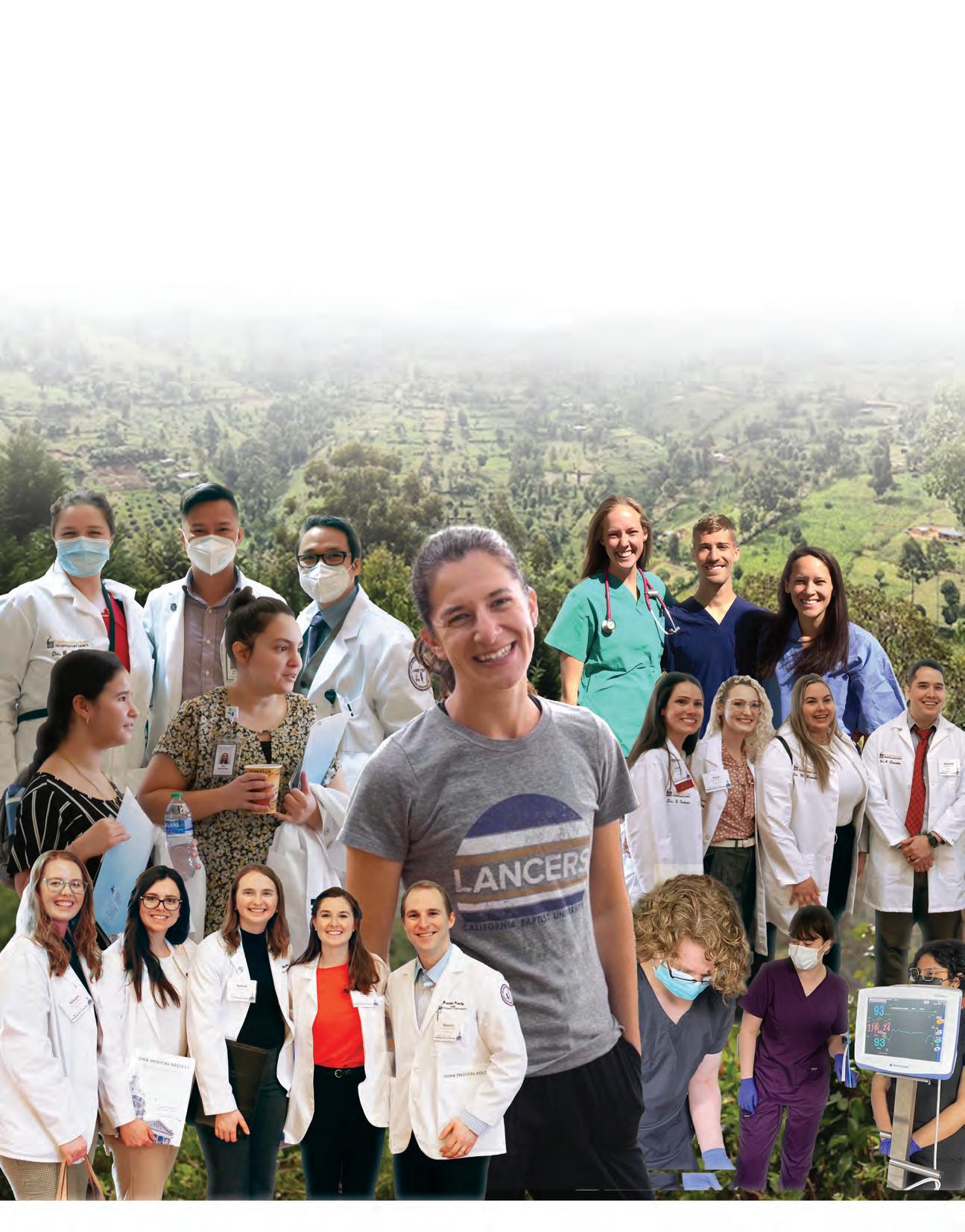
JOURNAL OF THE IOWA MEDICAL SOCIETY | JULY - SEPTEMBER 2024 | QUARTER THREE


JOURNAL OF THE IOWA MEDICAL SOCIETY | JULY - SEPTEMBER 2024 | QUARTER THREE
MEDICAL STUDENT EDITION
•
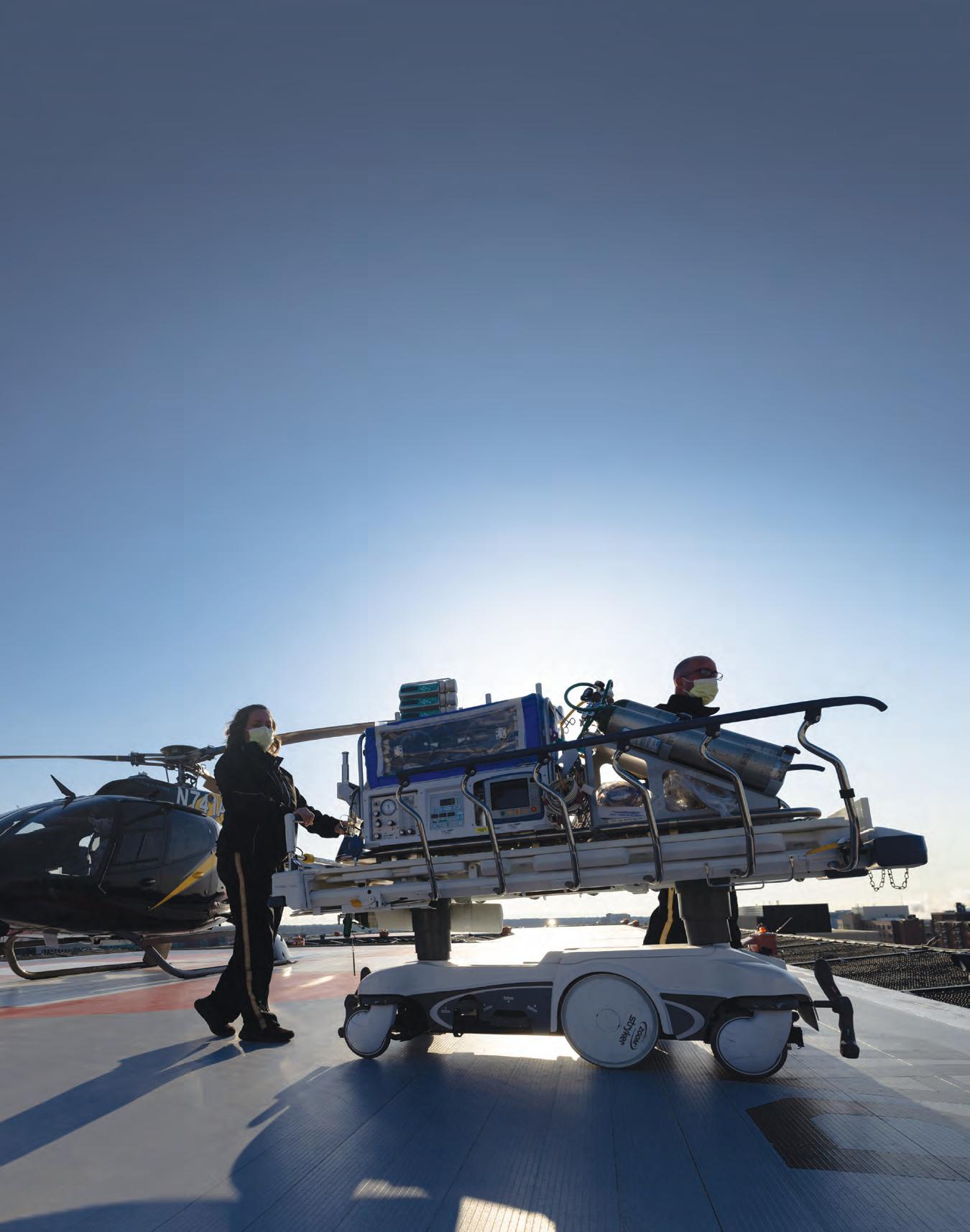
•
•
•
•


IMS Mission:
To advance the practice of medicine through advocacy, education, and engagement with physicians throughout Iowa to ensure the highest quality of care for the patients they serve.
IMS Vision:
To be the leading voice in medicine to make Iowa a premier destination for physicians to live, work, and serve their communities.
Contact Us: Iowa Medicine
515 E. Locust St., Ste. 400 Des Moines, IA 50309 Phone: 515.223.1401
IMS President: Christina Taylor, MD
IMS CEO : Steven W. Churchill, MNA
Executive Editor: Sara Opie
Managing Editor: Sydney Maras, MA
To Advertise: Contact Heather Lee Phone: 515.421.4776
Email: hlee@iowamedical.org
Subscriptions:
Annual Subscription $45
Iowa Medicine, Journal of the Iowa Medical Society (ISSN 0746-8709), is published quarterly by the Iowa Medical Society, 515 E. Locust St., Ste. 400, Des Moines, IA 50309.
Periodicals postage paid at Des Moines, Iowa and at additional mailing offices.
Postmaster:
Send address changes to Iowa Medicine, 515 E. Locust St., Ste. 400, Des Moines, IA 50309.
Editorial Content:
The Iowa Medical Society is unable to assume responsibility for the accuracy of submitted material. Editorial inquiries should be directed to the Executive Editor, Iowa Medicine, 515 E. Locust St., Ste. 400, Des Moines, IA 50309.
Copyright 2024 Iowa Medical Society: Opinions expressed by authors do not necessarily represent the official policy of the Iowa Medical Society. Iowa Medicine does not assume responsibility for those opinions. Products and services advertised in Iowa
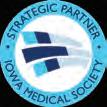
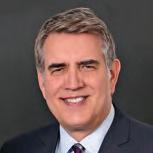
STEVEN W. CHURCHILL, MNA Iowa Medical Society, CEO
all is a special time on college campuses as students return to resume their classes.
And so in this issue of Iowa Medicine, we focus on medical students from across the country who have made Iowa their home to study the art and science of medicine. In August, I attended a student mixer with nearly 100 medical students in Iowa City as well as a networking event in Des Moines and was impressed with t heir enthusiasm and zeal as they embark upon an exciting chapter in their lives.
T he Iowa Medical Society connects with medical students on many levels. At the core, they serve as members of our board of directors, are represented on IMS committees and participate in education and
social engagements. But beyond Iowa, we fund opportunities that make it possible for students to participate with the AMA Annual and Interim meetings and to explore clinical experiences worldwide as a part of our Global Health Initiative funded by the IMS Foundation.
This past summer, AMA President Bruce Scott, MD, came to Iowa to help raise support for the Iowa Medical PAC, meet with the IMS Board of Directors, and visit with local media to put a spotlight on the physician shortage in Iowa and the challenges faced by the onerous requirements related to prior authorization nationwide.

years.

The AMA estimates that there will be a shortage of up to124,000 physicians in the United States in the next decade. That’s why addressing this impending crisis head-on is a strategic imperative for IMS.
T here are many factors that determine where a physician will practice – the number one indicator being the location of their residency training. Which is why one of the key initiatives in the IMS strategic plan is to increase the number of
It’s an ambitious goal, however, we are confident that by working in tandem with the new medical school deans at both the University of Iowa and Des Moines University, and with public officials, we can move the needle on this important initiative.
This is one piece of a complex puzzle that can help us to realize our vision to make Iowa a premier destination for physicians to live, work and serve their communities.
As we draw near to our milestone 175th anniversary in 2025, let us remember that the future of organized medicine and access to care in Iowa is tied to our medical students. It is up to us to be innovative, invest the resources, and create a climate that will welcome them to serve our communities in Iowa. ■
Steve Churchill, MNA, CEO and DMU students at the Des Moines Beers with Peers event in August.

IOWA PROJECT FIRSTLINE:
Keep patients healthy with free toolkits, training and more. GET FREE RESOURCES
You chose a healthcare career because you love helping people. Now there’s an easier way to protect your patients from a leading threat to their safety: healthcare-associated infections. It’s Iowa Project Firstline, where you’ll find the latest in tools and training. By putting infection control first, you’ll also be putting your patients first. Just like you always do.
SAMANTHA MORI
IMS Membership & Communications Associate
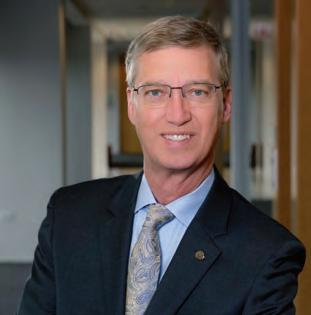
TAMA President, Bruce Scott, MD
he 179th President of the American Medical Association (AMA) Bruce Scott, MD, was in Des Moines this summer and sat down with IMS staff to discuss a variety of healthcare topics. Dr. Scott is from Louisville, Kentucky, has served on the AMA Board of Trustees as speaker and vice speaker of the AMA House of Delegates, and has been a member of the House of Delegates since he joined the AMA in medical school.
“I remember standing in the back of the room at that first meeting, being in awe of the process taking place – physicians from every state and specialty working together to impact the lives of our nation’s physicians and our patients,” explains Dr. Scott. “I was hooked, and I’ve been involved ever since.”
Over 271,000 active physicians, medical students, residents and retired physicians are members of the American Medical Association (AMA) across the United States.
Organizations like the AMA and the Iowa Medical Society (IMS) share similar goals. They are dedicated to promoting the interests and well-being of physicians, which can also benefit their patients and communities.
AMA President, Bruce Scott, MD, in Des Moines with students
Today, as physicians face a myriad of challenges on both the state and federal levels (like the need to expand the physician workforce, the expansion of scope of practice for non-physicians, prior authorization restrictions and repayment plans) organized medicine is needed more than ever.
If not the AMA, then who?
“Sometimes I ask those that question the importance of the AMA - if not the AMA, then who? Who will continue to respond to the challenges and obstacles that undoubtedly lie ahead – the continued financial assault on physicians, the impediments that payers place on the care we prescribe for our patients, the continued expansion of scope of practice of non-physicians, the next cyberattack on a health insurance giant that disrupts our practices, the next pandemic?” questioned Dr. Scott.
“Is each state medical association and specialty society going to go it alone – creating a patchwork of effort or more likely a divided profession? Who will advocate on a federal level for our patients and our profession? The insurance lobby or the pharmaceutical companies? Private equity investors? Perhaps the
hospital association? Or could we just leave it up to the bureaucrats?
I think not! Our profession needs a unified voice to represent the best interests of physicians and our patients – organized medicine is that voice.”
Physicians are seen as leaders
T he unified voice of organized medicine can only go so far though. It remains important that individual physicians become involved with organizations like the AMA and IMS to increase awareness of the issues they’re facing.
“Physicians are seen as leaders,” explains Dr. Scott. “Legislators need and want to hear from [us].
Conveying the challenges you face and the solutions you need is critical to affecting change. The things that are impacting your practice are likely impacting other physicians and patients in the state and across the country.”
Organized medicine not only offers a unified voice to represent t he interests of physicians and their patients, but it also offers valuable resources to those physicians they represent.
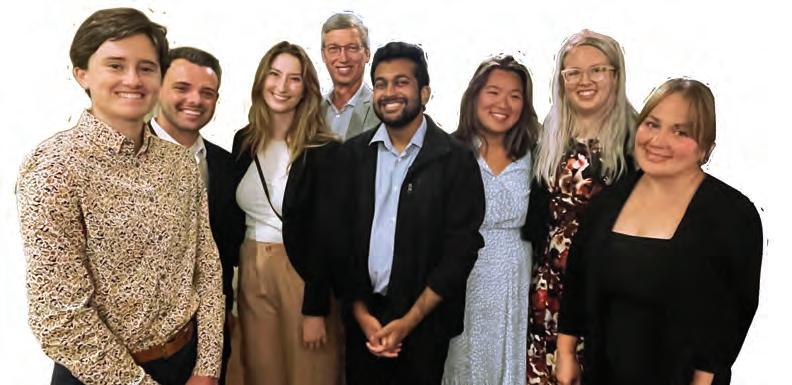
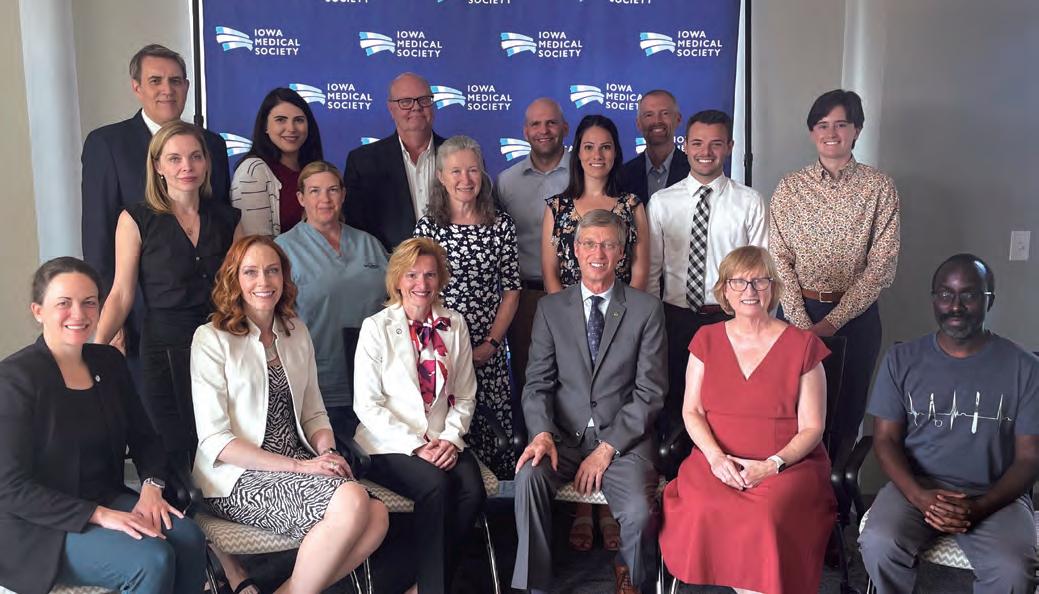
The AMA offers member benefits ranging from loans and financial services to education resources for continuing medical education (CME) and discounts on transportation and entertainment.
IMS offers member benefits to physicians in Iowa that include CME, health news resources, networking opportunities, and leadership opportunities. County and specialty societies offer even more benefits for physician members to access.
“The most important benefit [of organized medicine] is not one you can put in your pocket,” says Dr. Scott. “It is the ethics and advocacy to represent our profession.”
IMS was instrumental in the 2023 passage of Tort Reform in Iowa and is now focusing on expanding the physician workforce within the state. For this effort, IMS is supporting:
• Increasing funding for the Rural Physician Loan Repayment Program by $1.4 million.
• Policy efforts to implement the Iowa Rural Healthcare Workforce Stategic Action Plan.
• Increasing funding for additional positions within existing residency and fellowship programs.
• Reform of prior authorization.
• Seeking opportunities for new residency and fellowship programs for Iowa’s most in-need specialties.
• Pursuing tax credit incentives for receptors and new physicians beginning their practice in Iowa.
The AMA is also focusing on the physician crisis facing rural America and has outlined five key strategies to address this issue:
1. Fix the Medicare payment system.
2. Address workforce burdens that drive burnout and early retirements.
3. Enact legislative fixes to grow the physician workforce, including expanding residency and graduate medical education slots, incentivizing physicians to work in rural communities and supporting an expanded role of international medical graduates.
4. Permanently remove telehealth restrictions.
5. Tackle chronic disease head-on.
We need every physician to join us in the fight
“As a practicing physician myself, I live the issues facing physicians every day. I see my colleagues struggling,” explains Dr. Scott.
“The problems facing medicine are no longer hypothetical. Physician practices are closing, and patient access is suffering. It’s time to get
off the sidelines and get into the game. We need every physician to join us in the fight.”
The AMA, IMS, and other organizations representing physicians across the United States, are invested in protecting the future of medicine for physicians a nd patients.
“The future of medicine is bright with robotic surgery, advances in genomics and digital medicine, but healthcare faces challenges that we must tackle now,” states Dr. Scott. “We need a unified voice for a stronger profession and healthier communities.” ■
more information about the AMA’s five key strategies, listen to Episode 27 of Doc 2 Doc featuring Dr. Scott.
Each year, the Iowa Medical Society Foundation (IMSF), uses money raised to support the international travel and medical learnings of Iowa medical students as part of the Global Health Clinical Rotations/Experiences. In 2024, thanks to generous donations, IMSF was able to make financial gifts to 30 students who were traveling abroad. Below are a few snapshots of the enriching experiences these students had during their travels.
Reese McQuaid Costa Rica
In late May 2024, thanks to the Iowa Medical Society, I visited Costa Rica to volunteer and improve my Spanish.
Every Tuesday and Thursday morning, all the DMU students would volunteer at a clinic in Heredia, Costa Rica. The clinic was a long-term care facility for disabled adults. Initially, we essentially shadowed a nurse to make sure we learned and understood our
The Iowa Medical Society Foundation (IMSF) is a voluntary organization that uses personal donations from physicians and friends of medicine to inspire, facilitate, and expand the educational and philanthropic endeavors of the Iowa Medical Society. To learn more or donate go to: iowamedical.org/ ims-foundation

a computer while we worked, and many members of our group enjoyed interacting with the patients by dancing to help distract them while they were being treated.
I feel this experience was incredibly important to my development as a physician. I also absolutely loved the culture of Costa Rica and would greatly enjoy going back to visit, possibly even on another medical trip when I am a physician. This trip has also made me want to improve my global health, and I may decide to apply for an MPH. Overall, I
experience for me, especially given my heritage as a Thai/Lao American. It provided a unique opportunity to engage with the healthcare team and patients. During my time at CMU, I worked closely with the anesthesia department, family medicine department, and palliative care department.
Matching into Anesthesia just before starting this global health elective added special significance to the experience. It allowed me to see firsthand how my chosen specialty is practiced differently abroad compared to the U.S. For instance, the variations in operating room attire protocols were fascinating, highlighting the influence of cultural and institutional norms on medical practice. Additionally, learning about differences in anesthetic choices due to cost considerations was humbling. It underscored the financial responsibility physicians must adhere to when delivering anesthetic care and made me more aware of the economic aspects of healthcare. One of the most eye-opening aspects
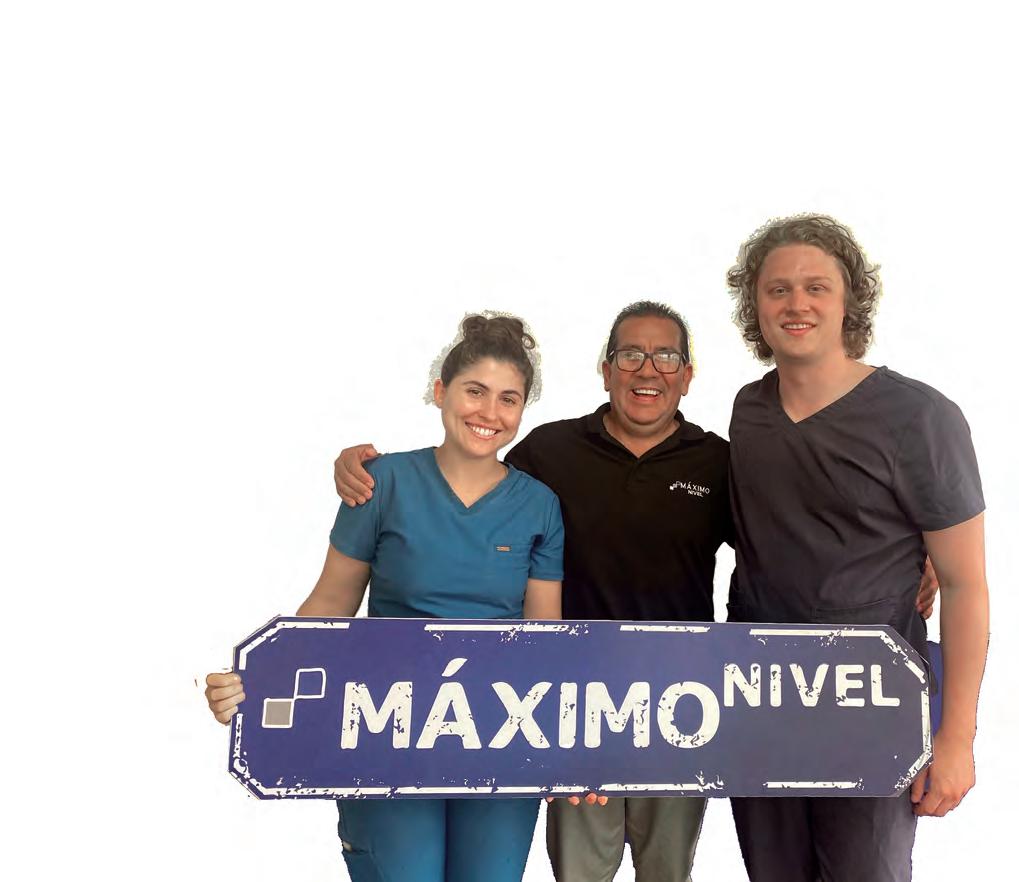


was observing the reuse of certain medical equipment in Thailand, which is typically single use in the U.S. This practice made me acutely aware of the significant cost burden that healthcare systems face when resources are not utilized efficiently. It also emphasized the importance of resourcefulness and adaptability in different healthcare settings.
While working with patients in the family medicine and palliative care departments, I was particularly moved by the treatment of monks, who received care in entirely separate facilities from the public. This practice highlighted the deep respect and reverence for religious figures in Thai culture.
This experience developed my appreciation for the cultural dimensions of patient care and strengthened my commitment to delivering compassionate, culturally sensitive medical care in my future career. I plan to return as an attending physician to provide further care to the Thai community again when I practice Global Health.

“Scrubbing into surgeries, rounding with doctors, performing ultrasounds, befriending local nursing students, and making connections with nationals and missionary families all profoundly shaped my understanding of local needs, and my future in global health.”
– Rachel Fajardo Gorelik
Kenya
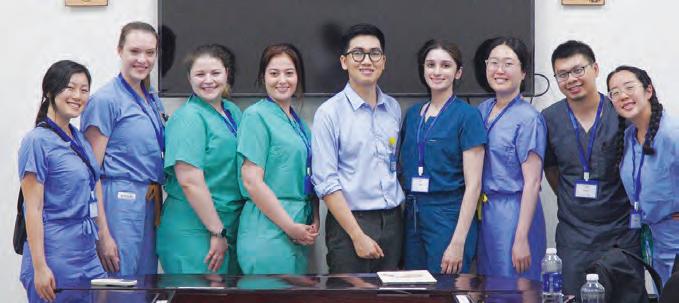
I want to thank the Iowa Medical Society again for providing me with financial support regarding the Global Health Spanish Immersion Trip in Costa Rica.
I entered Costa Rica with no background in Spanish, this made the trip one of the most challenging things I have ever done in my life. These feelings of fear, confusion, and anxiety are what I imagine nonEnglish speaking patients must feel when in a primarily English-speaking healthcare setting. I have always felt sympathy for these patients, but now, I can say that I truly empathize with them. In my future practice, I hope to help patients feel comfortable, safe and understood even if their first language is not English. I strive to show my patients the same grace and kindness that Costa Rican locals showed me.
Phuoc Nguyen Vietnam
My journey to Vietnam proved to be an invaluable experience, offering profound insights into the healthcare landscape of the country. It provided a unique opportunity to delve into the intricacies of healthcare delivery, forge connections with local medical professionals, and gain firsthand knowledge of prevalent medical conditions among the populace. Exploring the healthcare infrastructure of Vietnam unveiled significant aspects such as the medical training regimen, patient-to-room ratios, staffing dynamics, and the accessibility of medications without prescriptions. Engaging in discussions with Vietnamese counterparts facilitated a deeper understanding of their treatment methodologies, available pharmaceutical options, and the potential for collaborative endeavors aimed at advancing medical education.
Continues on next page
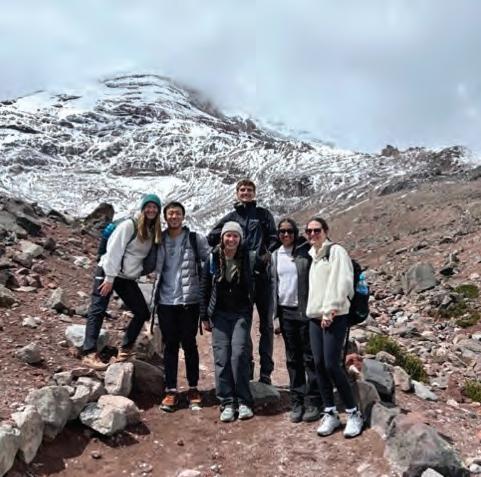
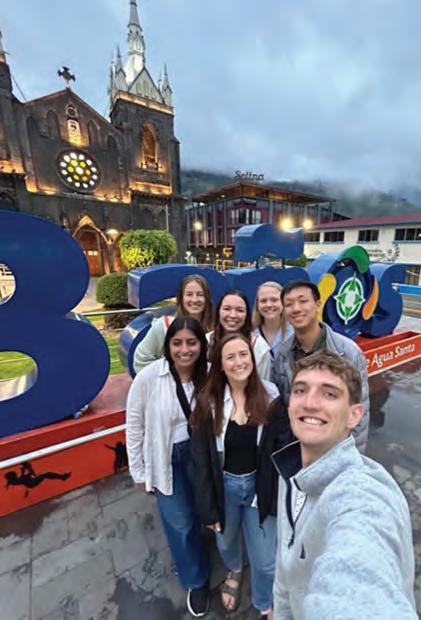
Most importantly, I aspire to return to Vietnam to provide medical care and become an integral part of the community. This trip also allowed me to forge lifelong friendships and reconnect with my birthplace.
Blu Schultz
Riobamba, Ecuador
My first clinical experience location was a small health clinic in a neighboring town called Calpi. In these towns, and throughout Riobamba, these small health clinics are termed “Central de Salud” where patients would first go for their wellness checks and if they are having a non-emergent health crisis. Here, I shadowed various doctors and their interactions during routine health visits.
At this clinic, they perform a mode of physical activity in the form of
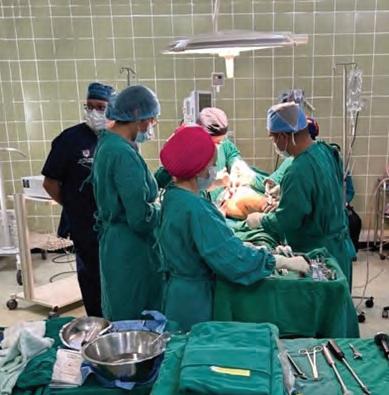
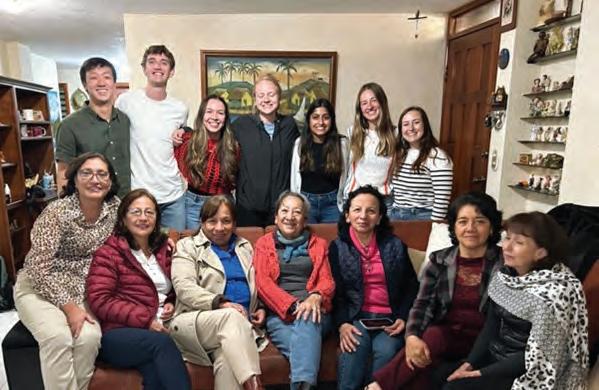
dancing as a “prescription” to their patients. Anyone was allowed to join these Monday and Thursday sessions that lasted an hour and was led by Dr. Carmen who kept everyone on their toes with her dancing. Other activities that the doctors in Calpi (and the other central de saluds) would do is community outreach. One day we went to the local elementary schools to administer vaccines to the children, and another day we did somewhat of a census check-in with at-risk homes in the community. We also had the opportunity of learning from doctors in the Cacha region, which consisted of walking to house visits and interacting with the indigenous population in the region. Finally, our last four weeks consisted of shadowing in the hospital in different specialties.
One of my goals was to improve my physical exam skills. While I was able to conduct some physical exams on patients, it was not to the extent of what we do in the United States. These were much more rushed, and we only looked at a few different things. So while we were able to do some physical exam skills, it seems like much more of the medical knowledge that I gained came from the conversation between the patient and the provider, as we were there to shadow more than anything.
The group you go with also determines how you feel, and my group was amazing. We are very close now, and that is one of the reasons why I would do this all over again, because I got to meet a group of people I will be connected with for the rest of my life. ■
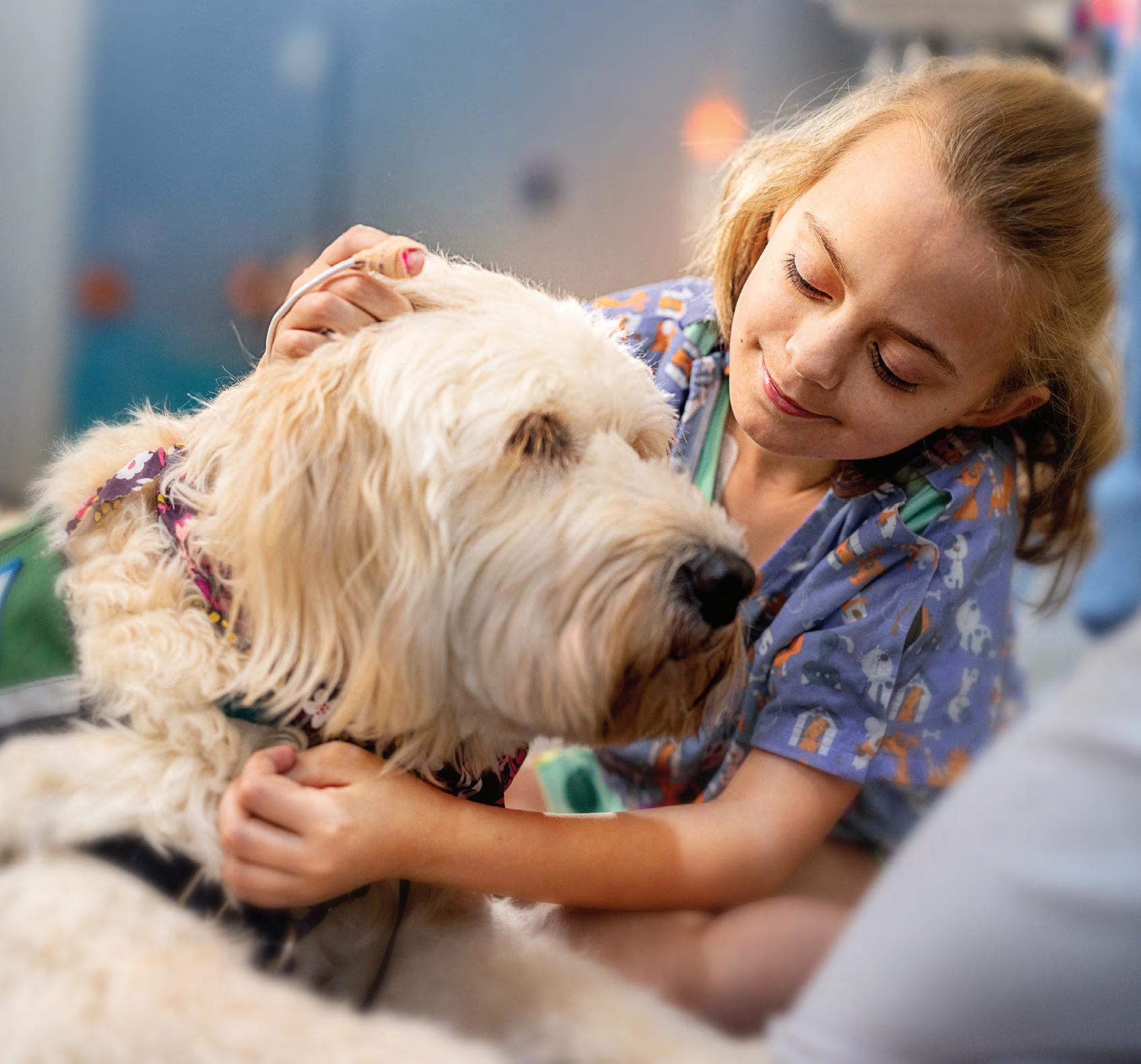
SYDNEY MARAS, MA Communications Manager
The future of Iowa’s medical profession and patient care ultimately lies with our state’s medical student population. It’s wellknown that Iowa faces a shortage of physicians, especially in rural areas. According to the Common Sense Institute, Iowa 2024 Healthcare Landscape report, rural Iowa has 17% fewer physicians per capita than in urban areas.
T his however, has not stopped the University of Iowa’s Carver College of Medicine and Des Moines University’s College of Osteopathic Medicine from proving through enrollment numbers and residency matches year after year, just how dedicated and passionate young people are about making a difference in medicine, and how many would like to be able to stay in Iowa to practice medicine full-time.
We reached out to several medical students to ask for their insights into
their lives, including volunteer work, professional development, social networking, spending time with friends and family, and more. What we found was a diverse set of motivations and aspirations, leading back to a consistent, over-arching desire for all: connecting with and helping others.
“When I was 14 years old, my father passed away after an extended battle with cancer. His fight with terminal illness was a testament to his own resilience and to the unrelenting efforts of healthcare workers. Inspired by my father's cancer treatment team, I was drawn to medicine, because physicians are able to positively impact the lives of their respective patients and communities.” – Jordan Samuel (DO, 2027)
by personal experiences, empathy, and wanting to make a difference. This includes taking part in medical advocacy efforts at both the state and federal level. Through the Iowa Medical Society’s policy forum process, and involvement at the American Medical Association (AMA)’s annual meetings and advocacy conferences, the students
“When I was a teenager, I often accompanied my grandparents to their doctor’s appointments because English wasn’t their first language. Every conversation I had advocating for my grandparents’ health with the physicians deepened my interest in pursuing medicine.”
– Adrienne Nguyen (DO, 2026)
we spoke to have already taken meaningful steps at this stage in their careers to use their voices for change. No matter where they came from to study medicine, and regardless of which path they are taking to becoming a physician, it is clear that our student members are passionate and driven.
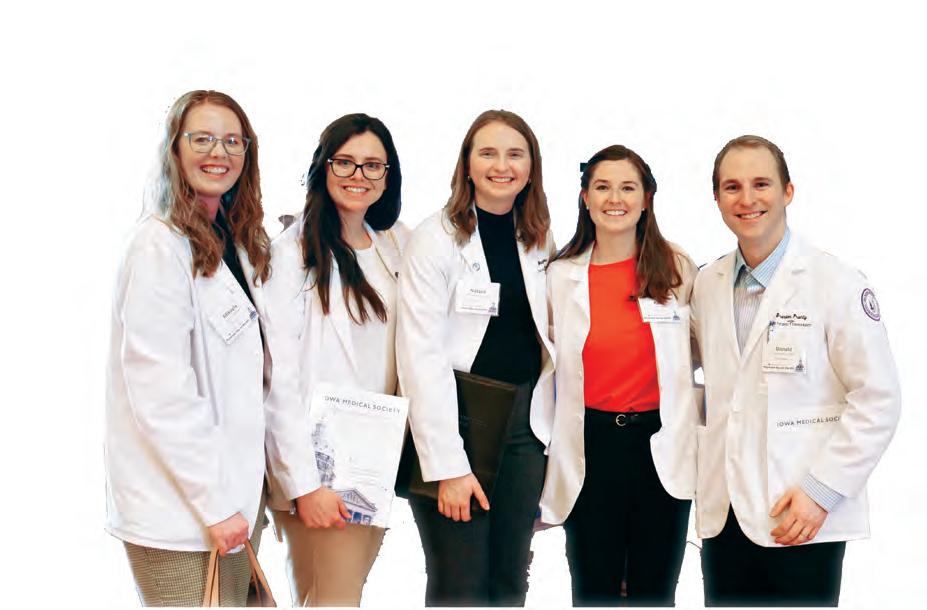
When asked how they have benefited from being involved in organized medicine, many shared how these advocacy opportunities have given them perspective about the field of medicine and allowed them to make connections with actively-practicing physicians and lawmakers.
“The physicians I met while serving on the IMS Board of Directors gave me encouragement to know that my advocacy mattered. Over the years, attending physicians and residents have cited my ease in which I advocate for patients and incorporate
myself quickly as a member of the healthcare team. As a resident, my involvement in IMS has been key in navigating our complex healthcare system. I feel like I can anticipate issues before they come up.”
– Mikayla Brockmeyer, DO, former IMS Board member
As many actively practicing physicians will attest, having a mentor who believes in you and encourages you to pursue your dreams can be instrumental in pointing you toward the direction of a successful future. The students we talked to were more than happy to return their appreciation to those who have guided them on their journeys thus far:
“Before entering medical school, two of my most influential role models were Drs. Sharon Smith and Ching Lau at Connecticut Children’s. They taught me the value of embracing discomfort—constantly analyzing and identifying areas for improvement to drive meaningful systemic change. Here in Iowa, Dr. Rob Lee has been a pivotal mentor. He taught me the importance of finding my niche within organized medicine, helping me navigate the many different advocacy avenues and discover where I can make the most meaningful impact.”
– Adrienne Nguyen, (DO, 2026)
“At DMU we are matched with a second year ‘big’ to show us the ropes of medical school and someone to bother with questions. I was lucky enough to be matched with Josi Barscz who is heavily involved in IMS and advocacy. Josi made me realize that it is possible to be a successful medical
Our Contributors:
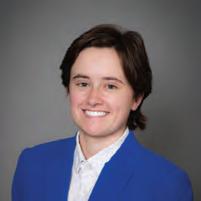
student while still following your passions.”
– Mallory Britz (DO, 2027)
In addition to advocacy, many students have been able to take advantage of the Iowa Medical Society Foundation’s Global Health Scholarship Program and travel to different areas of the world, gaining valuable clinical experience while making a difference in low access areas. You can learn more about these student experiences on pages 8-10.
In Iowa, medical students will soon be faced with the question of where they will be matched as a resident and are most likely thinking about where they would like to go into full time practice in the future.
Here is what our respondents had to say about this, and what excites them about the future:
“I was born in Des Moines, and Iowa has always been home. Iowans hold a strong sense of community, evidenced by the well-known "Iowa Nice"
“The sheer volume of knowledge that we have already accumulated and will continue to grow in the coming decades excites me regarding the future of medicine. It is said that medical knowledge doubles every 72 days. That is greatly exciting and daunting. My hope is that we will figure out how to utilize that new knowledge for the betterment of health in society.” – Josi Barscz, (DO, 2026)
In 2024, 13 students from Des Moines University and 17 students from the University of Iowa Carver College of Medicine were awarded funding through the IMS Foundation and were able to immerse themselves in other cultures and make unforgettable memories:
“Our host parents in Ecuador were nothing short of amazing. They were always so caring and were so patient with us learning Spanish. If you do decide to go with this program, I think you have made an excellent choice, and it will be something that can benefit you for your entire career. I would do this all over again, because I got to meet a group of people I will be connected with for the rest of my life.”
– Blu Schultz (MD, 2027)

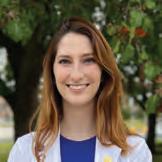
reputation which precedes us. This is a community that raised me, and one that I hope to give back to via patient care and advocacy.” – Jordan Samuel, (DO, 2027)
With the persistence of obstacles that uniquely affect those in the medical field, whether mental or physical, it’s important that physicians, residents, and medical students have passions outside of medicine that inspire them. IMS is committed to contributing to that sense of community for all of our members.
It is the enthusiasm of IMS’s youngest members – our future doctors – that emboldens the Iowa Medical Society to be the leading voice in medicine to make Iowa a premier destination for physicians to live, work, and serve their communities. ■

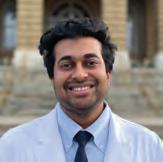
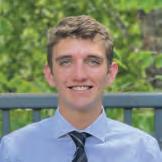
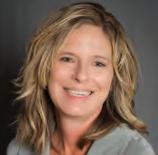
Membership and Sponsorship Director

AEngagement and Communication
s fall turns to winter, we are entering IMS’s annual membership renewal season! You can renew your 2025 membership starting November 1. Renewal can be done online, by phone, or mail. Please note that IMS changed our processor in 2024 so if your membership was on auto renewal, you will need to call and update your credit card on file. IMS Membership team can be reached at 515-421-4776.
Your IMS membership comes with many benefits:
• Advocacy: IMS is the leader in advocating for medical policies at the state level and partners with the AMA on a national level. Your IMS membership gives you a voice in shaping the future of medicine and helps you stay aligned with broader industry goals.
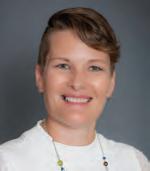
“Membership in a professional organization like Iowa Medical Society can be incredibly valuable for your career. It signifies a commitment to your practice of medicine, provides you with access to a network of peers, and the ability to make positive changes in medicine at the state and federal levels through advocacy.”
Mara Syring, DO, IMS Board of Directors and Membership Engagement Committee Chair
• Engagement:
Membership provides access to a network of physicians and leaders in healthcare across the state including peers, mentors, and game changers. Building these relationships can be crucial for career advancement and staying informed about industry trends. Visit IMS’s website iowamedical.org for upcoming events and engagement opportunities.
• Education: IMS offers workshops, seminars, a nd training sessions that help members stay current with new developments and enhance their skills. Most of these include CME, visit: members.iowamedical.org/ event-calendar for upcoming member trainings.
• Industry insights:
Membership includes exclusive access to Iowa Medicine, IMS’s quarterly magazine, weekly emails, legislative calls to action and the latest trends/medical news. This knowledge can help you stay competitive and innovative in your field.
• Discounted medical malpractice insurance: All IMS physician members are eligible to receive a 10% discount on medical malpractice insurance from COPIC. This discount is available from any insurance broker. For more details, contact Heather L. Lee at HLee@iowamedical.org.
To check your membership status/ level, join online forums or get more involved, log into your account at iowamedical.org. If this is the first time you are logging in or if it has
been over a year since you have logged in, hit the member login button on the homepage, then hit the “Create One” link.
For more information about IMS membership and the different benefits/levels including: Early Career, Part-Time, Individual and discounted 100% Group Membership (5%-40% discount depending on group size and length of agreement) scan this QR Code or email HLee@iowamedical. org. We hope that you will choose to continue your membership for 2025! ■

Why I am an IMS member:
“This started as an automatic membership as a resident, but I have continued over the years to stay connected to a community of physicians across the state, to have access to important educational resources, to be informed about issues impacting physicians, and to have a larger voice through the collective action that comes with an organization representing physicians in our state.”
Cheryl True, MD
“As the Iowa healthcare system continues to get more complicated, it is important we let decision makers know that we, as physicians, are the most welltrained healthcare professionals and ready to handle all the complexities that arise with taking care of patients and improving the communities where we live.”
Jeremy Cordes, DO
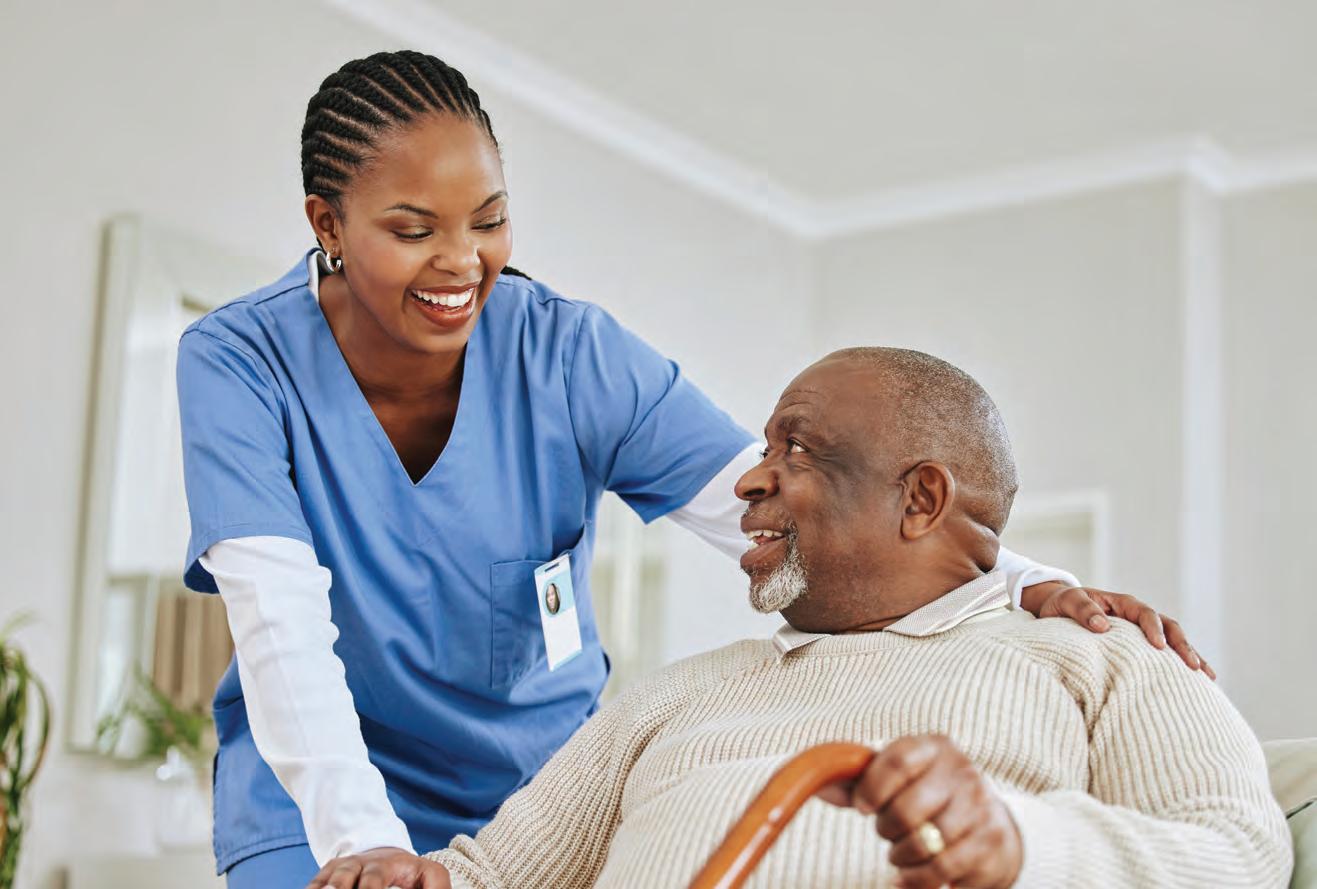
When it comes to referring your patients to a home health care provider, quality matters.
At the Good Samaritan Society, we are devoted to helping people successfully live in their homes for as long as possible.
Our team of nurses, therapists and specially trained aides supports patients physically, emotionally and spiritually.
Making a referral is easy and convenient. Call (855) 446-1862 to find the right home health services for your patient.


SETH BROWN, JD
IMS Government Relations Director
We are doing great work with Iowa Medical PAC (IMPAC), raising over $55,000 this year and having over $75,000 in total to support candidates in 2025. We have had a remarkable year for IMPAC giving as we have already raised record high funds. This effort, coupled with strong grassroots advocacy, gives us the political heft we need to be heard during the legislative session. We are grateful to our contributors so far in 2024 and those who have attended IMPAC fundraising events.
The IMS Committee on Legislation meets over the legislative interim to develop recommendations for the upcoming IMS Legislative Priorities. Following establishment of initial recommendations, the IMS Board of Directors votes to approve the priorities. On September 16, the Committee convened to approve IMS’s legislative agenda for the 2025 Iowa Legislative Session. See what IMS will advocate for in the upcoming session on the IMS website: iowamedical.org/advocacy.
The Iowa Medical Society fights on the frontlines for physicians at the Capitol during the legislative session but recognizes the importance of meeting with legislators during the interim. Relationships are built in the off season. IMS encourages members to contact their state legislators now and offer to be a resource during the upcoming session. The more physicians we have speaking to legislators, the more successful we will be for our members, and even more importantly, their patients.
Here are five ways you can engage and advocate for the house of medicine in 2025:
1. Physician Day on the Hill:
Register and attend Physician Day on the Hill (PDOTH) on Tuesday, February 11. This IMS organized event is a great opportunity to speak with your legislators about the issues that matter most to you. IMS staff is available to help with the conversations and will provide a briefing session in advance. Last year we had nearly 100 physicians in white coats filling the Capitol rotunda. This year, as we celebrate our 175th anniversary, we want to have a strong member presence as part of our milestone year.
2. Offer to be a resource:
Relationships are built in the off season. Send an introductory email to your state legislator over the interim and offer to be a resource as they consider healthcare bills during session.
3. IMS Action Alerts:
Sign up for IMS Action Alerts. This is an easy way to get timely updates on key legislative priorities with Call to Action alerts for IMS advocacy campaigns and ready-made templates for reaching out to your legislators. When signing up for Action Alerts, check the box to provide your mobile phone number and instantly be notified via text message when your advocacy efforts are needed most!
4. IMS Advocate:
Be sure to read our weekly electronic newsletter sent every Saturday while the legislature is in session. The Advocate contains timely legislative and policy updates important to Iowa physicians.
5. IMS Advocacy website:
Check out the updated Advocacy webpage and check it often. There is information about IMS’ state and federal legislative priorities, issue toolkits and talking points, a legislator look-up tool, and links to t he Iowa Medical Political Action Committee and Policy Forum.
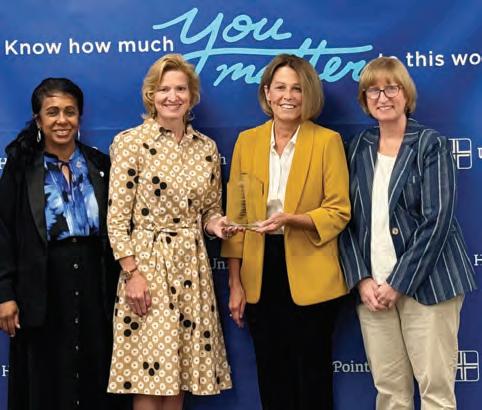
IMS staff and physician leaders at UnityPoint Health Trinity Regional Medical Center in Fort Dodge meeting with members and awarding Representative Ann Meyer with the IMS Public Service Leadership Award for the key role she played in enacting Tort Reform into law.
IMS conducted its Fall 2024 Policy Forum on September 20. The Policy Forum serves as the official process by which IMS establishes and amends policy. Policy Forums are held twice annually, in the Spring and Fall, with the 20 elected members of the IMS Board of Directors comprising the membership of the Policy Forum. Policy Forums are preceded by Testimony Forums, virtually enabled forums within which IMS members have the opportunity to offer testimony in support of, or in opposition to, the Policy Request Statements (PRSs) that are under consideration by upcoming Policy Forums.
In total, four Policy Request Statements (PRSs) were submitted by members during the 24-2 ‘Call to Action’ period from
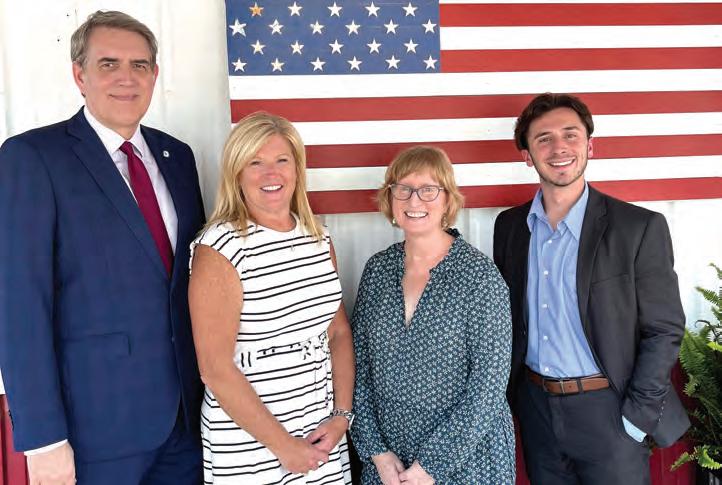
Steven W. Churchill, MNA, CEO, Representative Shannon Lundgren, Alison Lynch, MD, President-Elect, and Ryan Roberts, MJ, Policy Analysis & Grant Initiatives Manager
August 9 to August 23. Read more about the process and the adopted policies on the IMS website: iowamedical.org/advocacy/policyforum.


Feel free to email me (sbrown@iowamedical.org) for more information and sign up for action alerts on the IMS website for the latest campaigns: iowamedical.org/action-center.

DAVID A. CONNETT, DO, FACOFP
Dean of Des Moines University College of Osteopathic Medicine
As Dean at Des Moines University-COM, I am both honored and excited to share my vision for the future of academic medicine. In an era defined by technological innovation, artificial intelligence (AI) stands out as a transformative force that promises to revolutionize both research and clinical practice.
Today, as we stand on the brink of a new era, it is clear that AI will play a pivotal role in seamlessly integrating academic research with clinical practice. Despite its potential, fewer than 5% of physicians fully understand the transformative impact AI will have on all facets of medical practice. We are already witnessing AI’s capabilities in various domains:
Medical Imaging:
AI has demonstrated its ability to screen chest X-rays with accuracy comparable to, and sometimes exceeding, that of human radiologists. Recent studies, such as one published in The Lancet Digital Health (2023), have shown that AI can reduce diagnostic errors in mammography by up to 25%, significantly improving early detection rates of breast cancer.
Pathology:
AI-powered tools are now capable of evaluating histological specimens with precision, assisting pathologists in diagnosing conditions ranging from cancers to autoimmune diseases. A 2024 study published in
Nature Medicine highlighted t he use of AI in identifying rare genetic mutations in tumors, which has profound implications for personalized oncology.
Genomics and Predictive Analytics: AI is revolutionizing personalized medicine by optimizing treatment regimens based on a patient’s genomics and cellular markers. This is particularly evident in oncology, where AIdriven platforms are being used to predict patient responses to immunotherapies, as documented in a 2023 report from the Journal of Clinical Oncology.
Ophthalmology:

exams and manual treatment central to osteopathic practice remain irreplaceable.
AI’s ability to perform comprehensive retinal exam analyses is already being used to predict the onset of chronic conditions such as Parkinson’s disease, dementia, cardiovascular diseases, and diabetic progression. A 2022 study in The Lancet demonstrated that AI could predict cardiovascular risk with greater accuracy than traditional methods by analyzing retinal images.
While AI offers new opportunities, the foundation of our practice remains evidence-based. AI can support clinicians by automating data collection and analysis, making research participation more accessible. However, AI cannot replace the essential human elements of medicine. The personalized care and tactile components of physical
Ethical considerations are also paramount. As AI becomes more integrated, we must address patient privacy, data security, and the potential for bias. A 2024 New England Journal of Medicine article stressed the need for ethical frameworks to guide AI development and use in healthcare. Ensuring transparency and equity is essential to prevent healthcare disparities. AI presents unparalleled opportunities to advance research, enhance practice, and improve patient outcomes. At DMU we are committed to embracing innovation while upholding osteopathic medicine's core principles. By leveraging AI, we can empower the next generation of physicians to deliver compassionate, humancentered care. With AI as our ally, the future of medicine is bright, offering groundbreaking progress in research and clinical practice. ■

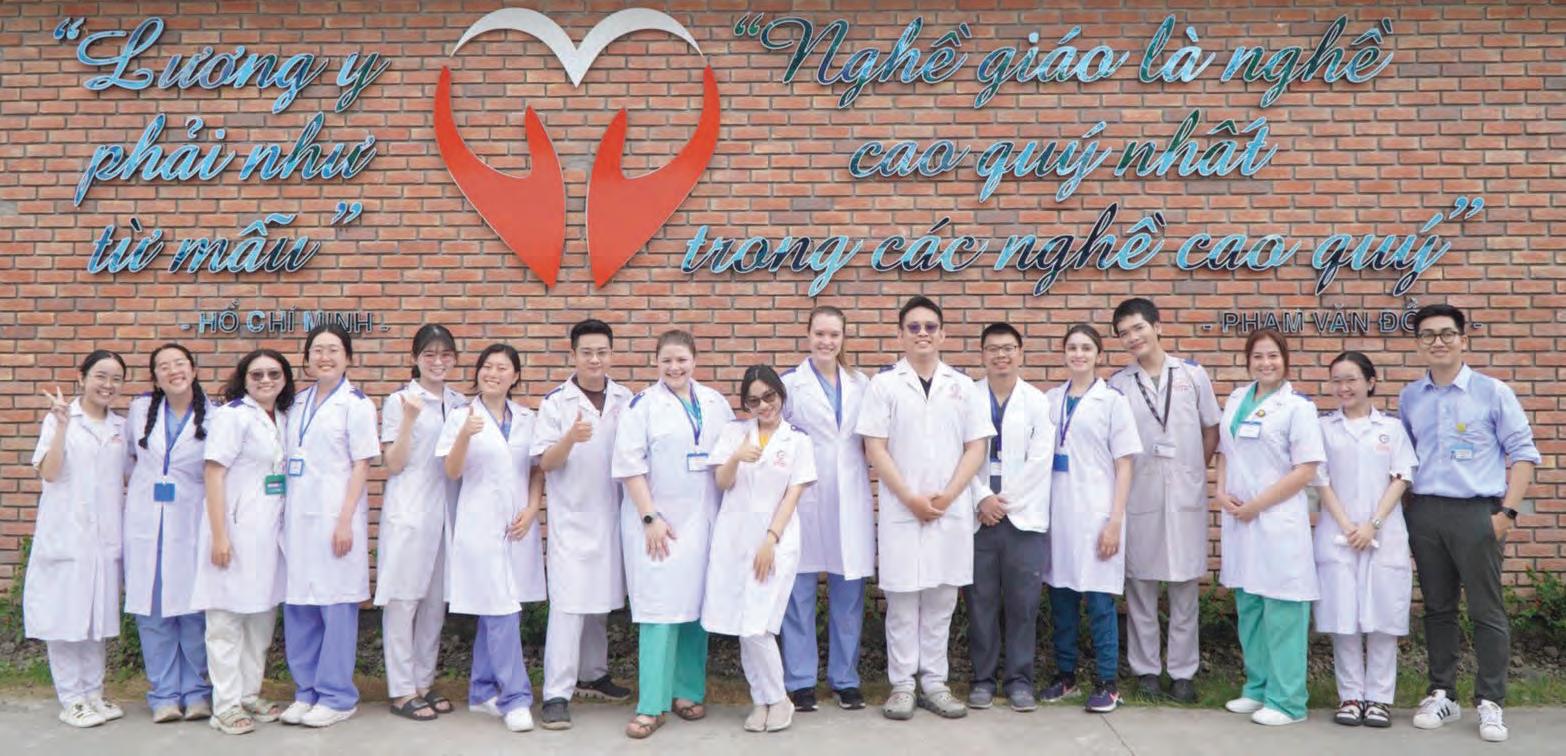
The Iowa Medical Society Foundation uses donations from physicians and friends of medicine to inspire, facilitate, and expand the educational and philanthropic endeavors of the Iowa Medical Society. From sponsoring medical student white coats and student travel opportunties to attend meetings of the AMA and experience Global Heath Studies, IMSF supports our students during milestone events and encourages them to engage in the house of medicine.

But it doesn’t stop there - the Foundation supports physicians as they begin their work and the medical community at large via:
Public health initiatives
CME and professional development programs
Other unique leadership opportunities
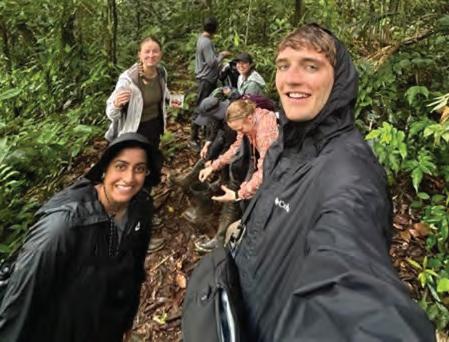
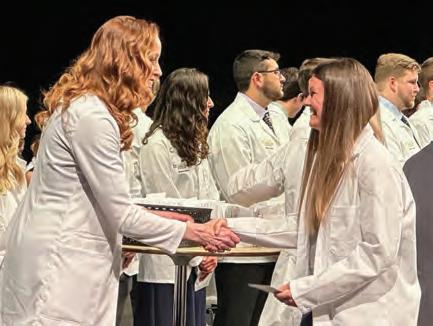
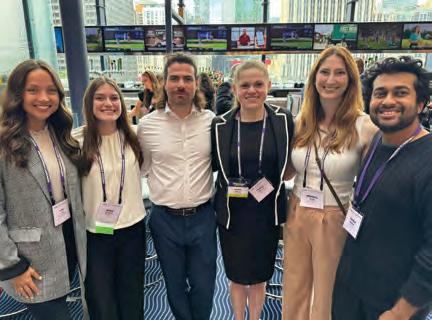
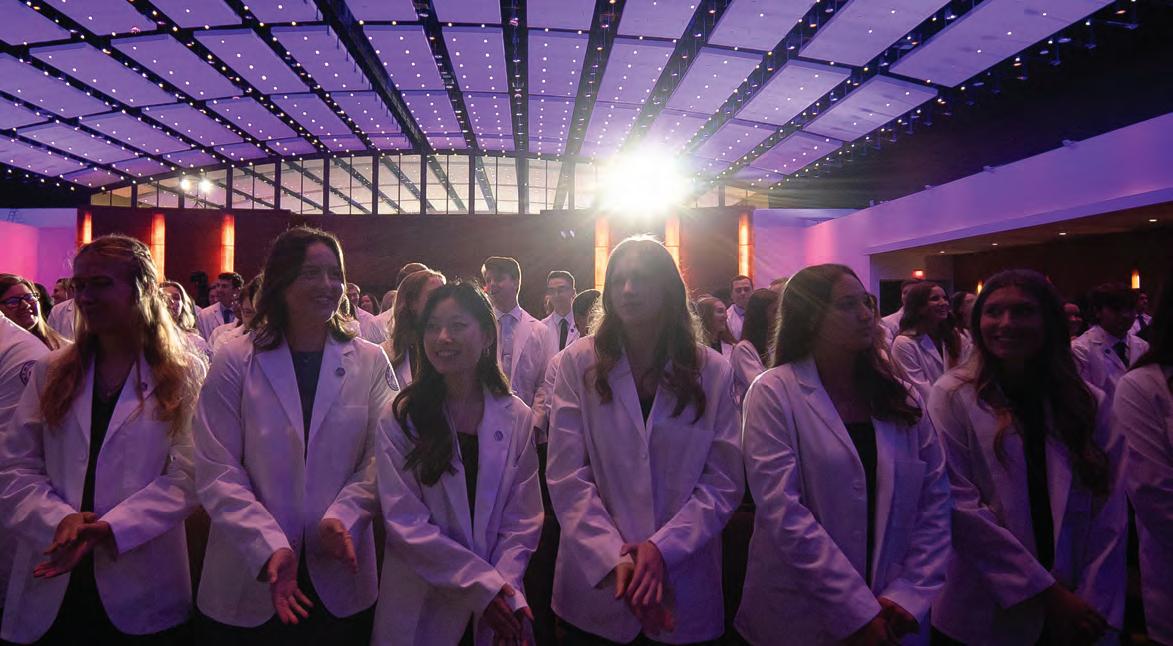
SPECIAL THANKS TO DMU PHOTOGRAPHER: BYRON JONES COURTESY OF DES MOINES UNIVERSITY
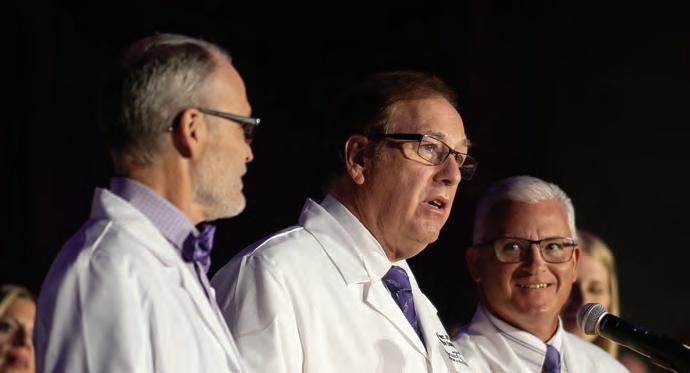
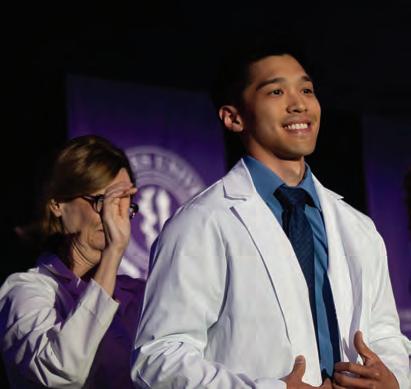
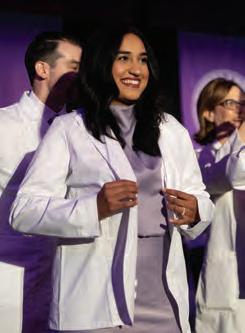
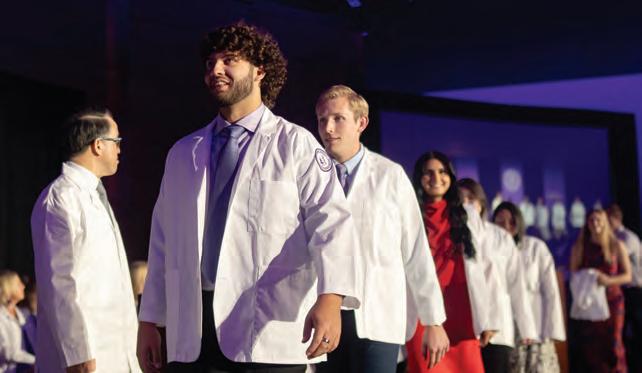

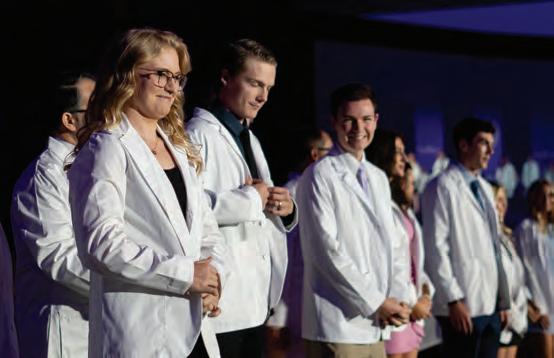
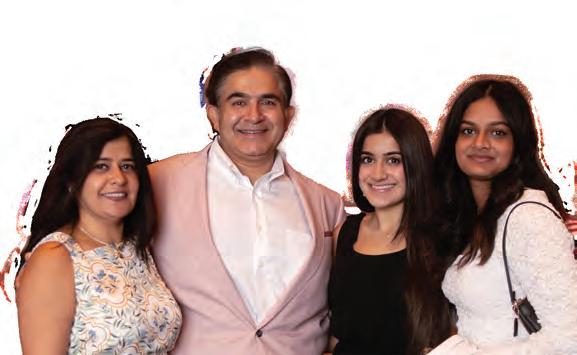

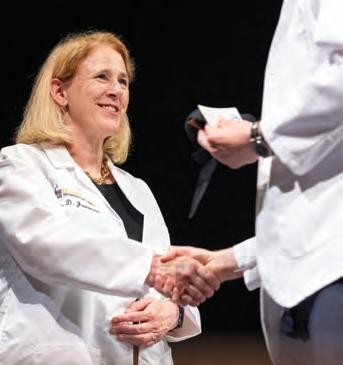
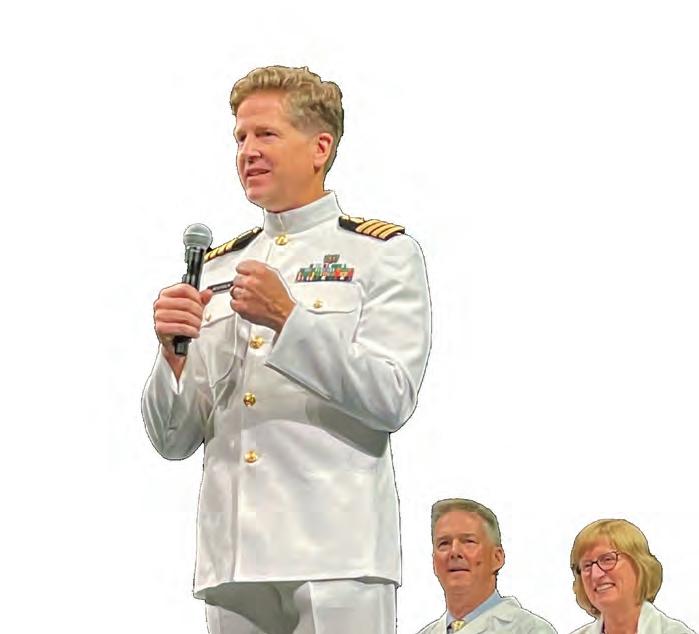
SPECIAL THANKS TO UI PHOTOGRAPHER: LIZ MARTIN, UI HEALTH CARE MARKETING AND COMMUNICATIONS
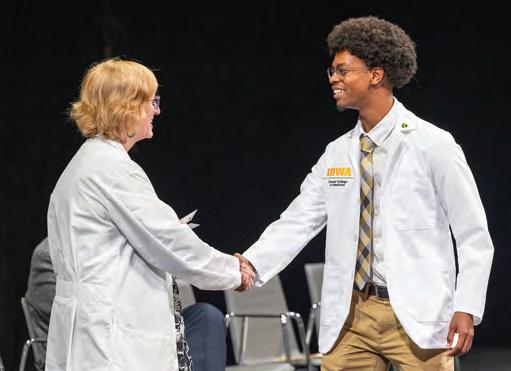
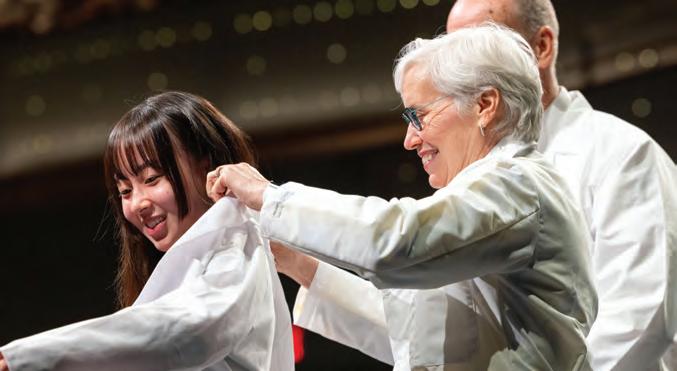
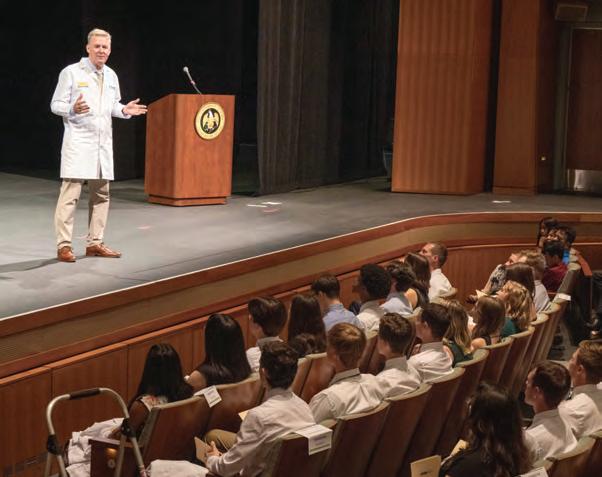
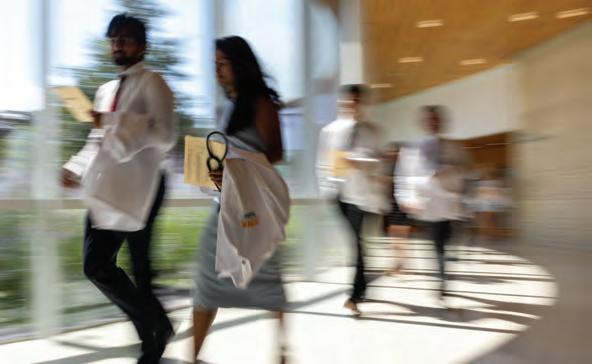
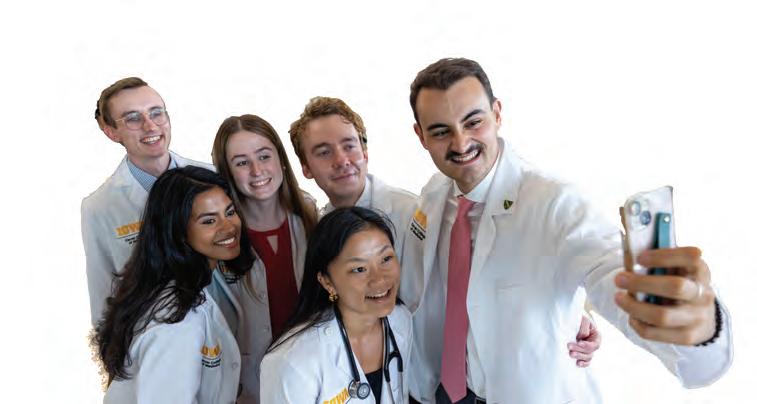
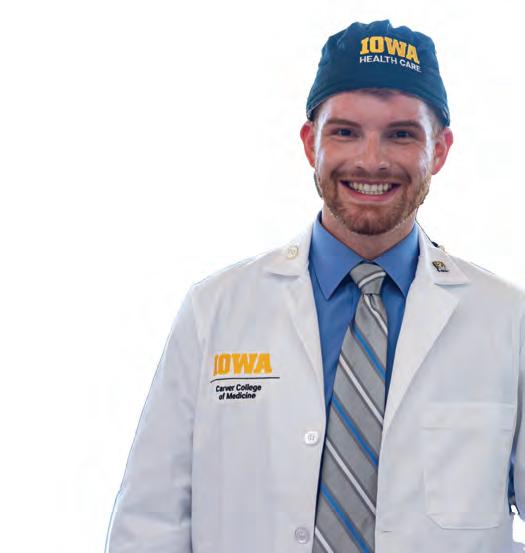
Cornea & Cataract Surgeon, Wolfe Eye Clinic
What inspired you to become an ophthalmologist?
Ishadowed a cataract surgeon who used iris hooks to expand the pupil, allowing him access to remove the cataract. That opened my eyes (pun intended) to the world of ophthalmology and how life-changing the surgeries can be for patients. I wanted to brighten someone’s world with visionrestoring surgery.
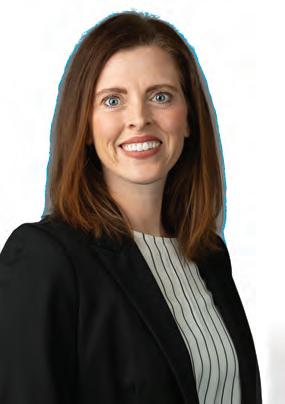
How did you end up at Wolfe Eye Clinic?
I sought out a highly regarded specialty practice,
Wolfe Eye Clinic was the obvious choice. I love sharing patients with my colleagues in other subspecialties so patients can have all their eye care under one roof. I also take great pride in working with the Wolfe Foundation, which allows us to provide care to underserved populations.
Why are you a member of IMS?
As ophthalmologists, our attention is targeted to such a small organ, but first and foremost, we are physicians and surgeons. IMS allows me to remain connected to colleagues in many other fields of medicine. The advocacy offered by IMS is crucial to our profession.
Why should more doctors come to Iowa to practice medicine?
Iowa is a fantastic place to practice medicine. If you want to live
rurally, you can have a wide scope of practice. There are abundant opportunities to sub-specialize. You will not find more appreciative patients, which is what makes going to work every day a privilege and joy. At the end of the day your quality of life is dictated by the people who surround you. “Iowa nice” is not just a slogan but my everyday reality among patients, staff, and colleagues, and I feel honored to call myself an Iowan.
What is your best advice for new physicians?
Take on the hard cases. Push yourself to be the best doctor that you can. Advocate for those who have no other advocate. When you’re not sure what to do, ask yourself what you would want in the patients’ shoes, and you will find the honorable path forward. ■
Mark your calendar and plan to join us for any of the upcoming activities. Additional events, timely updates, and registration are available on the IMS website at: iowamedical.org
EDUCATIONAL WEBINARS:
CE Webinar: Public Health & Artificial Intelligence (AI) with Dr. Benzoni
Tuesday, October 16
12:00 PM - 1:00 PM Zoom
CE Webinar: SUD/OUD Friday, December 17 12:00 PM Zoom

Beers with Peers
Physician networking event Wednesday, October 16
Big Grove Brewery, Iowa City 5:00 PM
Crucial Conversations Saturday, October 19
Graduate Hotel, Iowa City 9:00 AM - 4:00 PM
Sioux City Blitz Day Tuesday, October 29
Main and Abbey, Sioux City 5:00 PM
Physician Day on the Hill Tuesday, February 11 11:00 AM
State Historical Building, Des Moines
Mason City Blitz Day Thursday, March 27
Mason City
President’s Reception and IMS 175 Celebration Friday, May 2
Hancher Auditorium, Iowa City


“
“
JOIN ME AND OVER 5,700 MEMBERS OF IMS AS WE ADVANCE THE PRACTICE OF MEDICINE THROUGH ADVOCACY.
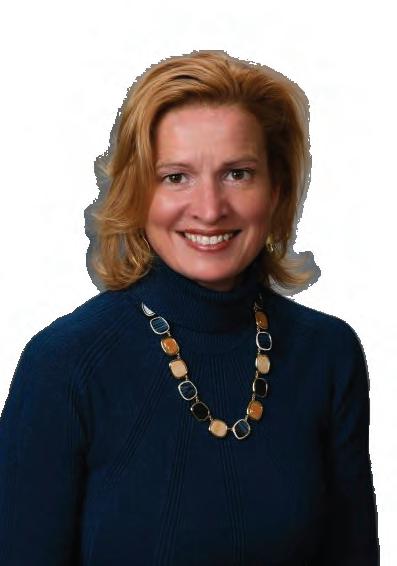

RENEW YOUR IMS MEMBERSHIP TODAY!”
JOIN ME AND OVER 5,700 MEMBERS OF IMS AS WE ADVANCE THE PRACTICE OF MEDICINE THROUGH ADVOCACY. RENEW YOUR IMS MEMBERSHIP TODAY!”
“I’m grateful to have opportunities to collaborate with other physicians on medical, leadership, and policy issues.”
“I’m grateful to have opportunities to collaborate with other physicians on medical, leadership, and policy issues.”
MD IMS President


-Lisa
Muncy-Pietrzak,
-Lisa Muncy-Pietrzak, MD
“I am interested in and support the advocacy IMS does on our behalf, and I also like the networking and camaraderie membership offers us as physicians.”
“I am interested in and support the advocacy IMS does on our behalf, and I also like the networking and camaraderie membership offers us as physicians.”
-Brad McClimon,
-Brad McClimon,
MD
MD
COMMIT TO RENEWING YOUR IMS MEMBERSHIP TODAY
COMMIT TO RENEWING YOUR IMS MEMBERSHIP TODAY
LEARN WHY PHYSICIANS
LEARN WHY PHYSICIANS JOIN THE IOWA MEDICAL SOCIETY
JOIN THE IOWA MEDICAL SOCIETY
Contact: Doug Kenner physicianjobs@mountainmedgroup.com EEO/AA Employer/Protected Vet/Disabled Physician Opportunities Physician-Led Medicine with Partnership Track Opportunity
Join our collegial teams within Iowa’s largest physician-owned, multi-specialty clinic. Seeking physicians for the following specialties:
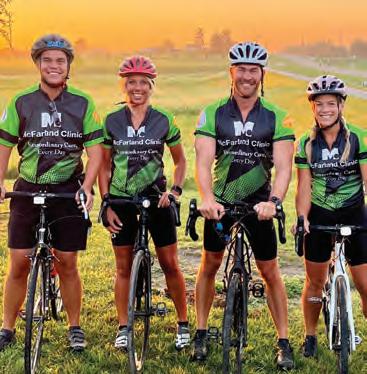
Cardiology - INT/EP
Dermatology/Mohs
Endocrinology
Family Medicine
Gastroenterology
General Surgery
Internal Medicine
Neurology
Otolaryngology
Pediatrics
Radiation Oncology
Radiology
Urology
Enjoy work-life balance in a family-friendly community with smalltown charm and big-city amenities nearby. Affiliated with a Baldrige and Magnet® recognized hospital. Large established referral network. Offering top-tier compensation and benefits.
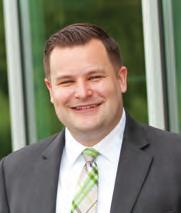
It’s inspiring, especially working in the financial & investment industry, to see clients who love to make an impact beyond their own bottom line. To many of the clients that we’re fortunate to work with, charitable giving strategies are a large part of how we assist them. One of the best strategies for charitable giving is to open and fund a Donor Advised Fund (DAF).
Many have heard of and use DAF’s. DAF’s could be a great solution for clients who have a strong desire to make a charitable impact through their lifetime while saving some tax along the way. DAFs can be great planning tools for tax-efficient giving. While I’m not aware of any research to back this up, the clients I work with who have DAF’s enjoy them. What are some of the things they’ve told me they enjoy?
• DAF’s help them to be intentional with their giving. The DAF makes it easy to put their goodwill into practice, because they can automatically contribute to it on a monthly, quarterly or yearly basis.
• When they fund their DAF, those charitable dollars need a home. Several of my clients have told me how much they enjoyed researching organizations to give grants to. In fact, I just met with a client last month who shared that they were looking through the website for a specific organization. Through the search, they discovered many similar organizations.
• Having a DAF has led many of my clients to consider what they really care about. It has led to good conversations between spouses and partners about the connection between personal mission and charitable organizations. Another advantage of a DAF is the ability to name a single donor or multiple successor donors. This is a great way to pass on the value of giving from one generation to the next. Most people are familiar with naming a beneficiary on investment accounts. With a DAF, you can name charitable organizations as beneficiaries just like with any other
account, which also may make sense in your estate plan. However, you can also name successor donors. A successor donor would be an individual(s) who would “inherit” the DAF at your passing and would take over the responsibilities to find causes for those dollars to support. It allows your heirs to inherit funds that are specifically earmarked for charitable purposes, so that they can participate in finding causes to support with those funds.
If you are interested in passing on the values of charitable giving as a part of your estate plan, reach out today to have a conversation with our team on how to incorporate that as part of your legacy.




Foster Group® provides customized financial planning and investment management services to people who want more. Not more status … but more purpose. We use tested methods to help you pursue your goals, whether you want to taste wines across the world, or get a taste of service in your community. It’s all part of being Truly Cared For®

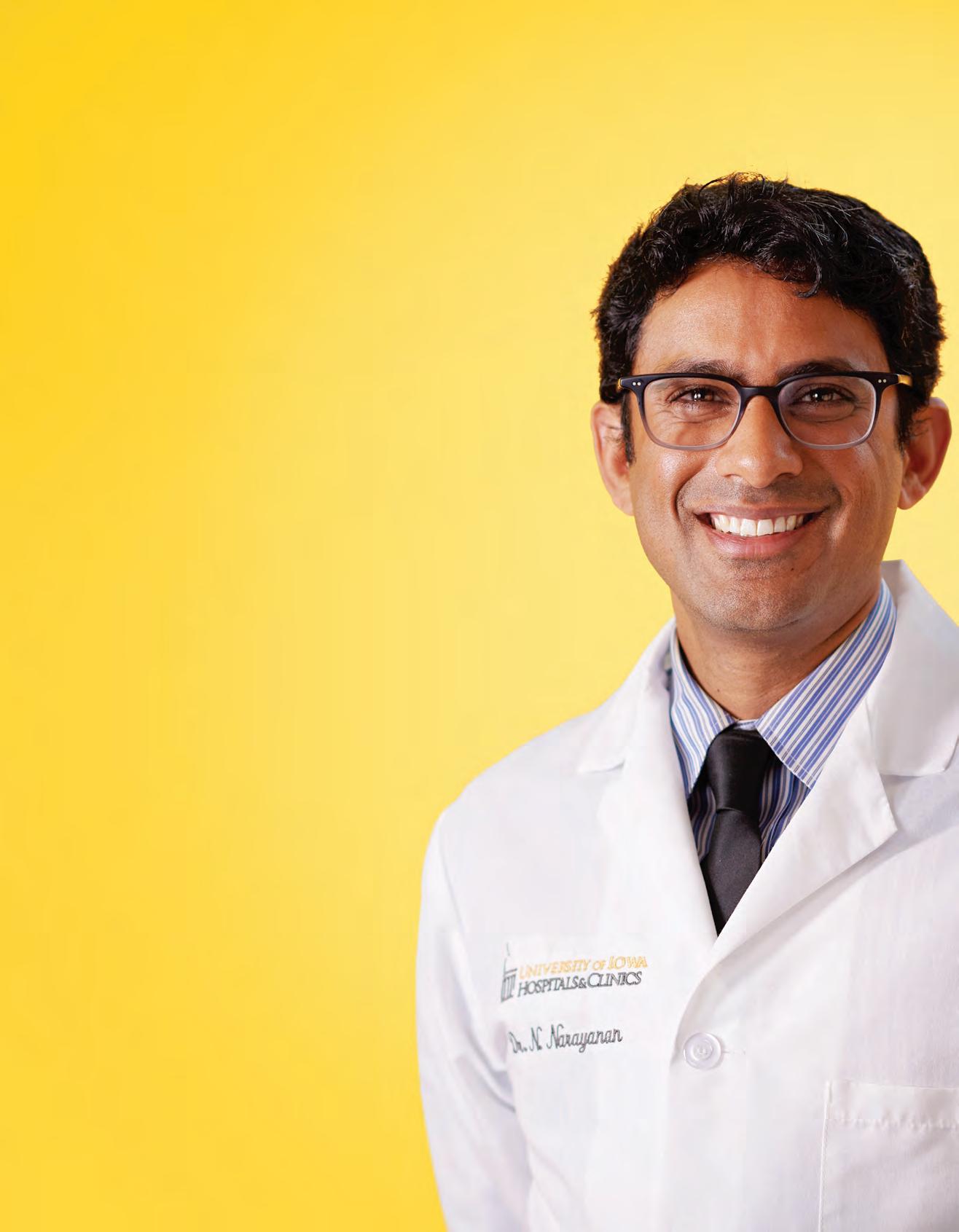
I’m here for one purpose and that’s to give my patients the best medicine has to offer.”
Our teams are made of experts with different backgrounds, specialties, and passions, because we know more collaboration leads to more options. Combined with the abilities that come with academic medicine, we don’t just deliver the latest life-saving treatments, we discover them. All so we can change medicine and lives right here in Iowa.
Learn more at UIHC.org

As a premier medical liability insurance carrier, we are committed to being there when you need us. Our physicians and other staff serve as extended members of your team to help answer questions or navigate difficult situations. And when it’s urgent, you have 24/7 access to a physician via our Risk Management hotline. Plus, our legal and HR experts help you tackle other issues as they arise. That’s Value Beyond Coverage.
COPIC is proud to be the endorsed carrier of the Iowa Medical Society. IMS members may be eligible for a 10% premium discount.